|
|
|
Sort Order |
|
|
|
Items / Page
|
|
|
|
|
|
|
| Srl | Item |
| 1 |
ID:
152492
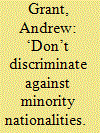

|
|
|
|
|
| Summary/Abstract |
Through an analysis of popular posts Tibetans shared over the social media application WeChat in 2013 and 2014 and offline discussions about them, this paper shows how Tibetans living in and traveling through Xining City practiced and performed their ethnic identity in the face of perceived harassment. Through their viral posts, they created a cyber-community that contributed to Tibetan ethnic group formation when Tibetans interpreted their ethnic identity as the basis for unjust treatment by the Chinese state and private Han individuals. In online posts the Han are portrayed as harassing Tibetans after terror attacks across China, violating minzu rights, denigrating Tibetan culture and territory, and denying Tibetans equal footing as modern compatriots. Social media are changing the ‘representational politics’ of Tibetan ethnicity, altering participation in the representation of the Tibetan ethnic group. Still, online discourse remains subject to constraints; private offline discussions remain important fora of opinion exchange.
|
|
|
|
|
|
|
|
|
|
|
|
|
|
|
|
| 2 |
ID:
177553
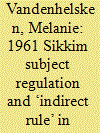

|
|
|
|
|
| Summary/Abstract |
This paper discusses the principles behind the 1961 Sikkim Subject Regulation, the first citizenship law framed in Sikkim. It explores the historical construction of the entanglement of ‘ancestrality’ with land property and political membership, which is central to the issue of citizenship in Sikkim today. It shows how categories of citizens were formed in colonial and post-colonial time, in particular the division between ‘natives’ (Bhutia and Lepcha) and ‘settlers’ (Sikkimese Nepalis). With the revision of the Regulation in 1962, land property and ‘ancestral’ settlement became central criteria to acquire Sikkim Subject status. The paper shows how land property have become a materialisation of belonging to the place, and highlights the inequalities that the dependency created between insidedness and land property engendered. It also argues that a sole analysis of these inequalities in terms of ethnicity is insufficient by showing that other factors have taken part in forming them.
|
|
|
|
|
|
|
|
|
|
|
|
|
|
|
|
| 3 |
ID:
096823
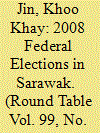

|
|
|
|
|
| Publication |
2010.
|
| Summary/Abstract |
In the aftermath of the 8 March elections, Sarawak was cast as an outlier, recalcitrant even, to the perceived 'revolt' against the incumbent Barisan Nasional. This short note attempts to show that Sarawak actually fell within the overall voting pattern viewed in its total range, rather than in summary outcomes. In that context, the note then attempts to argue that the voting patterns can be accounted for by local reasons, hopes and fears, particularly in the case of the minority indigenous groups collectively categorised as 'Other bumiputera'. However, Chinese and Malay constituencies exhibited a pattern clearly correlated to ethnicity.
|
|
|
|
|
|
|
|
|
|
|
|
|
|
|
|
| 4 |
ID:
144545
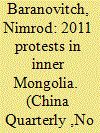

|
|
|
|
|
| Summary/Abstract |
In May 2011, Inner Mongolia experienced the most serious ethnic unrest in the region for 30 years. In this article, I explore the broader context that led to the eruption of the protests, with a particular emphasis on environmental issues. My aim is to explain why environmental issues occupied such a prominent position in the protests, and how these issues were connected to ethnicity. After discussing the material and practical implications of grassland degradation for Mongolian herders, I analyse the symbolic implications of this environmental crisis for the Mongolian educated elite, who have linked environmental issues to ethnic politics and identity. I argue that in the last 20 years or so, Mongolian intellectuals have developed a highly ethnicized environmental discourse, and that this discourse played an important role in informing the 2011 protests. My analysis focuses on this discourse as it is manifested in the domains of art, academia and daily discourse.
|
|
|
|
|
|
|
|
|
|
|
|
|
|
|
|
| 5 |
ID:
128862
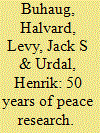

|
|
|
|
|
| Publication |
2014.
|
| Summary/Abstract |
Established in 1964, the Journal of Peace Research (JPR) celebrates 50 years. This anniversary special issue of the journal offers broad reviews of research areas that have been central both to the journal and to the field of peace and conflict research generally. An opening article co-authored by long-time editor Nils Petter Gleditsch offers a historical view on peace research and tracks trends in the use of 'peace' and 'violence' in titles of JPR across the first 49 volumes of the journal. Opening the review article section, two contributions address key thematic areas for the journal. Few if any subjects have attracted more attention in the study of international relations during the second half of JPR's first 50 years than the democratic peace, and in the extension of this subject, the broader debate about the liberal peace. Additional articles review the status and propose future developments in the study of war and its relationship with territory, ethnicity, ideology and natural resources. Another key historical topic associated with the journal concerns the economic cost of military conflict, while more recent research fields covered include terrorism and human rights, topics that have grown to become major JPR niches. Reflecting the methodological contributions by JPR, two articles focus on challenges of contemporary quantitative political analysis and progress in peace and conflict data collection. Finally, this special issue includes a review of research on international mediation in armed conflicts.
|
|
|
|
|
|
|
|
|
|
|
|
|
|
|
|
| 6 |
ID:
053191
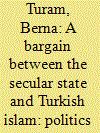

|
|
|
| 7 |
ID:
194895


|
|
|
|
|
| Summary/Abstract |
Jammu and Kashmir (J&K) occupied a unique place in the Indian federal structure as encoded in Article 370 of the Indian constitution. Incorporating Art. 370 in Indian Constitution reflected the recognition of the unique history and circumstances of J&K’s accession to India. However, the article proved a roadblock in the Indian state’s march to dictate and structure the politics of the state subservient to the perceived national interest, hence the unfailing attempts to gradually dilute it culminating in its total abrogation recently. The paper attempts at deconstructing the Indian state’s preoccupation with weakening Art. 370 by arguing that it represented the project of extending homogenization with the ultimate objective of exercising maximum control in a security-sensitive border state. The paper contends that the efforts at homogenization proved counterproductive; it far from bringing stability has caused more political fragility in the state, thus feeding the very dynamics that it has been seeking to contain. In conclusion, the paper offers deepening federalization as the likely pacifier for the festering conflict.
|
|
|
|
|
|
|
|
|
|
|
|
|
|
|
|
| 8 |
ID:
128890
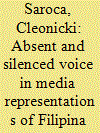

|
|
|
|
|
| Publication |
2013.
|
| Summary/Abstract |
This article explores the absent and silenced voice in Australian newspapers through case studies of two Filipino women - Nenita Westhof and Marylou Orton - who were victims of homicide in Australia. It draws on a feminist discourse analysis of newspaper articles and interviews conducted with their families and friends. The method used is one way of enabling people to hear the stories of those who do not have a voice in the present. Analysing newspaper representations in light of the interviews provides an entirely different, more accurate and just reconstruction of the women's lives. Media representations of Nenita and Marylou bore little resemblance to their 'lived reality'. In most instances, journalists did not acknowledge that the women were victims of domestic violence. Furthermore, sexist, racist and class-based discourses constructed Nenita and Marylou in accordance with dominant representations of Filipino women in Australia. They were held accountable for their own deaths, while their abusive male partners were frequently portrayed as victims of women who abused them. The article argues that such representations sensationalize the issues, misrepresent violence as the women's fault and shift responsibility from the perpetrator to the victim. In the process, they silence women's voices.
|
|
|
|
|
|
|
|
|
|
|
|
|
|
|
|
| 9 |
ID:
000691
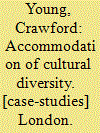

|
|
|
|
|
| Publication |
London, Macmillan, 1999.
|
| Description |
x,222p.
|
| Standard Number |
0333763076
|
|
|
|
|
|
|
|
|
|
|
|
Copies: C:1/I:0,R:0,Q:0
Circulation
| Accession# | | | | | | | | | | | |
| 042107 | 306/YOU 042107 | Main | On Shelf | General | | | | | | | |
|
|
|
|
| 10 |
ID:
130826


|
|
|
|
|
| Publication |
2014.
|
| Summary/Abstract |
Acharya Narendra Deva strongly believed that the Gandhian ideas based on morality and ethics could be the only solution to meet the basic needs of a society both developing and developed. It was thus that even after independence, he wielded the Gandhian weapon of Satyagraha most effectively to ?ght every form of injustice against the oppressed and the depressed in the then Indian society. Like Gandhi, he gave the highest priority for the removal of rural backwardness and he was in favour an innovative technology that could help in bringing an all round development in a developing society. He was a profound thinker who could analysis political, economic and social problems in their totality and his socio~political ideas about the solution to the problems facing the nation and society was exclusively original in its entirety. Narendra Deva accepted the value of morality and ethics of Gandhi and practised it fully throughout his whole life. It was Gandhi, who ?rst demonstrated the powerful effect on his countrymen of renouncing wealth for the sake of human service rather than personal salvation and Deva had trodden the same pathway into lndia's heart. Gandhi and Narendra Deva acquired their moral strength through renunciation, much as lndia's ancient sageswere supposed to obtain magical powers through their austerities. Their magic was singleness of purpose and an iron will. When Deva joined the Indian political
struggle under Gandhian leadership, the Mahatma once told him to simplify life and he took his words to heart. They never urged anyone else to follow their way of life and went their own way with a striking serenity. As a leading intellectual of outstanding mould, Acharya Narendra Deva had a forceful urge to bring about social justice, processed through a strong vein of idealism and always expressed deep concern for the down- trodden lndian masses. He remained a path?nder of the socialist movement in India and strongly believed that freedom was the first postulate for the establishment of the socialist society in India. He felt that without political independence the socialist programme could never become a reality. Narendra Deva always emphasized the moral and cultural elements of Marxism, but in the Indian socio-political context, he said that the class con?ict was already in existence and the real question was on whose side you were going to stand. Moreover, it was wrong to assume that the capitalist class had no vested interest in the freedom struggle. He, therefore, viewed that the socialists should create consciousness among labour, convince them that their interest would be well protected inn the freedom struggle and should broaden the base of that struggle by organizing the toilers. That is why; Gandhi and Deva wanted the historical stream of the cultural progress of India, in order to sustain the flow of continuity. In fact, Gandhi and Narendra Deva's entire socio-political ideas were ofa new social order purely based on universal love, ahimsa, morality and most importantly the role of ethics in Indian politics. Gandhi's ideal society was a non-violent and stateless society and repudiated state on ethical, historical and economic grounds. Unlike Marx, Gandhi and Deva persistently put emphasis on moral force and on the - realization of one's own self and there was no place for violence in their whole socio-political philosophy. The purpose ofthe article is to highlight the impact of ethics and morality on Narendra Deva's socio-political ideas and its relevance in the 21" century.
|
|
|
|
|
|
|
|
|
|
|
|
|
|
|
|
| 11 |
ID:
163303
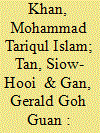

|
|
|
|
|
| Summary/Abstract |
This article presents the advanced financial literacy of Malaysian Gen Y investors and investigates whether literacy varies across demographics and ethnicity, and how financial literacy is related to investing decisions. In a survey-based study (N = 231) with the estimation of crosstab, ordered logistic regression and binary logistic regression, the results suggest that Gen Y investors display a medium level of financial literacy and that investors with certain demographic characteristics and ethnicity display a relatively higher level of financial literacy. Literacy items such as knowledge of stocks and bonds, functioning of the stock market, working of long-term bonds and mutual funds, and riskiness of bonds versus stocks are more closely related to investors’ trading, risky share investment, willingness of risk-taking, stock market participation and perceived portfolio returns. The results imply a clear scope to improve Gen Y investors’ financial literacy by concentrating on a certain socio-demographic groups and specific financial literacy items.
|
|
|
|
|
|
|
|
|
|
|
|
|
|
|
|
| 12 |
ID:
148242
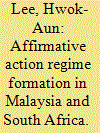

|
|
|
|
|
| Summary/Abstract |
This paper examines the formation of majority-favouring affirmative action (AA) regimes in Malaysia and South Africa. Malaysia’s Constitution premises AA on a group’s special position; South Africa’s refers to unfair discrimination. Malaysia established AA amid continuation of a political order and consolidation of executive power, while South Africa democratized and transitioned from minority to majority rule. Minority groups held less economic power in Malaysia than in South Africa. Consequently, AA in Malaysia is characterized by discretionary decision-making, and quota-based, centralized programmes, whereas South Africa has followed a legislative route involving negotiation and enforcement of target-based, statutory requirements, under less centralized oversight.
|
|
|
|
|
|
|
|
|
|
|
|
|
|
|
|
| 13 |
ID:
134170
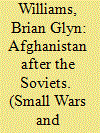

|
|
|
|
|
| Publication |
2014.
|
| Summary/Abstract |
In 1989 the Soviet Union withdrew its forces from Afghanistan leaving the embattled Afghan Communist government of President Mohammad Najibullah to fight against an emboldened mujahideen insurgency. Most experts expected a quick mujahideen victory once the Soviets were no longer directly involved in counterinsurgency operations in support of the Afghan government. But in the spring of 1989 the Afghan Communists beat the odds and defeated a mujahideen rebel offensive designed to capture the eastern city of Jalalabad. This proved to be a turning point, and for the next three years the Najibullah regime held out against the mujahideen 'freedom fighters'. In fact the Afghan Communist regime actually outlasted its sponsor the Soviet Union. The reasons for this remarkable achievement can be traced, in part, to ethnic-tribal divisions among the quarreling mujahideen parties and the Afghan government's ability to exploit them. This largely untold story has obvious implications for understanding the future of post-Karzai Afghanistan, tribalism, ethnicity, and foreign sponsorship in post-US Afghanistan. This article will explore the reasons for the resilience of the Najibullah Communist government and then assess possible implications for a post-2014 Afghan government.
|
|
|
|
|
|
|
|
|
|
|
|
|
|
|
|
| 14 |
ID:
114859
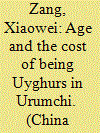

|
|
|
|
|
| Publication |
2012.
|
| Summary/Abstract |
This article asks: is the cost of being Uyghurs higher for young Uyghurs than for old Uyghurs in Ürümchi? I address this question with data from a survey of 2,947 people conducted in Ürümchi in 2005. The cost of being Uyghurs refers to the extent of economic inequality in the earnings of Han Chinese and Uyghurs. I develop three hypotheses on the effect of age on earnings differentials between Han Chinese and Uyghurs. Data analyses show that although young Uyghurs are better educated and earn more than old Uyghurs, they are more likely than old Uyghurs to suffer from being Uyghurs in Ürümchi. This finding has policy implications for the reduction of ethnic disparity in Xinjiang.
|
|
|
|
|
|
|
|
|
|
|
|
|
|
|
|
| 15 |
ID:
152606
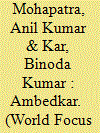

|
|
|
|
|
| Summary/Abstract |
The very essence of Ambedkar’s vision of social justice was to establish a just, equitable and fair society, where the women, scheduled castes and scheduled tribes would get their due place in the society and for that he did incorporate the provisions in the Indian Constitution so that they would get adequate opportunities so that they could be freed from the then prevalent social evils and ill-practices in the society. As an ardent champion of the cause, he sacrificed his whole life for the amelioration of the conditions of such people in the Indian society. Therefore, he is even hailed today as the messiah of the oppressed and downtrodden.
|
|
|
|
|
|
|
|
|
|
|
|
|
|
|
|
| 16 |
ID:
105362
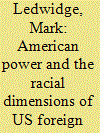

|
|
|
|
|
| Publication |
2011.
|
| Summary/Abstract |
This article consists of a critical discourse that examines the meteoric rise of Barack Obama within the context of international and domestic race relations. The article explores the impact of American racism on domestic and foreign affairs, in addition to providing contrasting viewpoints on the significance of Obama's election to the presidency. The article utilises the Obama phenomenon to assess US perceptions of the North-South divide, race, ethnicity, religion and anti-Americanism, in addition to unpacking the controversy surrounding Rev. Jeremiah Wright's characterisations of American power. The Obama campaign's post-9/11 context will be used to ascertain whether conservative efforts to associate Obama with Islam represent a conservative backlash that represents an ethnocentric re-articulation related to race, religion and the War on Terror, followed by an assessment of whether the Obama phenomenon is indicative of the perfectibility of US democracy, which would justify the exportation of American values. The article will engage in an interdisciplinary discourse grounded in political science, history and IR to provide the depth of knowledge and theoretical competency to frame the discussion in a historical and contemporary context that acknowledges Obama's relevance to domestic and international politics.
|
|
|
|
|
|
|
|
|
|
|
|
|
|
|
|
| 17 |
ID:
015110
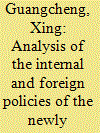

|
|
|
|
|
| Publication |
Dec 1992.
|
| Description |
51-59
|
|
|
|
|
|
|
|
|
|
|
|
|
|
|
|
| 18 |
ID:
082957
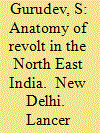

|
|
|
|
|
| Publication |
New Delhi, Lancer Books, 1996.
|
| Description |
xiii, 187p.hbk
|
| Standard Number |
8172010570
|
|
|
|
|
|
|
|
|
|
|
|
Copies: C:1/I:0,R:0,Q:0
Circulation
| Accession# | | | | | | | | | | | |
| 053670 | 954.1/GUR 053670 | Main | On Shelf | General | | | | | | | |
|
|
|
|
| 19 |
ID:
173866
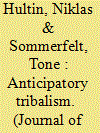

|
|
|
|
|
| Summary/Abstract |
This article examines the upsurge in denunciations of ‘tribalism’ in public debate during The Gambia's transition from the autocracy of Yahya Jammeh to the ‘New Gambia’ under President Adama Barrow. In these public debates, derogatory statements about particular ethnicities articulate fears of present or future alliances to monopolise political power. These fears are disproportionate to attempts of organised political mobilisation on ethnic grounds, which remain marginal. It is argued that accusatory politics are a salient, and neglected, feature of ethnic dynamics in contemporary Gambian – and African – politics. This politics of accusation involves the contestation and negotiation of moral legitimacy in the political sphere, in a manner challenging the separation of the moral and the political undergirding scholarly distinctions between ethnicity and tribalism.
|
|
|
|
|
|
|
|
|
|
|
|
|
|
|
|
| 20 |
ID:
106569
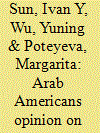

|
|
|
|
|
| Publication |
2011.
|
| Summary/Abstract |
While domestic and international terrorism have become the focal concern of the U.S. law enforcement and intelligence agencies, little is known about Arab Americans' attitudes toward counterterrorism policies that center on aggressive law enforcement practices. Using survey data collected from 810 Arab Americans, this study reported the general pattern of support for antiterrorism measures, including surveillance, stop and search, and detention, and examined the effects of race, ethnicity, and religion on measures targeting the U.S. citizens generally and Arab Americans specifically. The results revealed that the majority of Arab Americans showed weak to modest support for aggressive law enforcement practice, especially those targeting Arab Americans. Arab Americans' attitudes toward antiterrorism measures were significantly related to their ethnic identities and religion with those who identified themselves as Arab Americans and Muslim showing less favorable attitudes toward counterterrorism measures. Arab Americans' confidence in the federal government was also found to be positively associated with support for antiterrorism practices. Implications for research and policy are discussed.
|
|
|
|
|
|
|
|
|
|
|
|
|
|
|
|
|
|
|
|
|